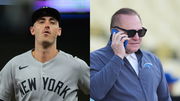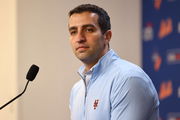
Imago
Source: IMAGO

Imago
Source: IMAGO
A mental blunder had never felt heavier for Orion Kerkering. With the bases loaded and two outs in the 11th inning Thursday night, the young reliever added to an undesirable history– he’d become only the second player in the league whose walk-off error had ended a postseason series.
Watch What’s Trending Now!
Kerkering, though, wasn’t hiding away from the harsh reality. “Just a horses— throw,” he said, owning his mistake. “Just keep it in the back of my head: This really f—— sucks right now. But hopefully, keep pushing. Get over this hump.” The response and accountability were so widely appreciated, another player ended up catching strays: Jazz Chisholm Jr.
Following the Phillies 2-1 loss to the Dodgers on Thursday, Dan Clark took to X to make a comparison. He applauded Kerkering for candidly facing media scrutiny after what he termed “the biggest postseason brainfade in 40 years,” while criticizing Chisholm for “cowardly” turning his back on a lineup decision. The post struck a nerve.
ADVERTISEMENT
Earlier this month, Yankees manager Aaron Boone decided to bench his $5.8 million infielder for right-handed hitter Amed Rosario at second base. It was Game 1 of the Yankees’ wild-card series against the Red Sox, and Chisholm was coming in hot. He was an All-Star with a career season that saw him become only the third player in franchise history to join the 30-30 club. So when he was moved to the bench, the infielder’s disappointment was evident.
While reporters questioned him about the manager’s decision following the 3-1 loss, he faced his locker instead of the cameras, sorting through hangers and offering minimal responses. The usually chatty Chisholm kept it brief. “We got to do whatever we got to do to win, right?” he said. “That’s how I look at it.”
The response hadn’t sat well with the Yankees faithful, especially considering there was reasoning behind Boone’s move. The new starter, Rosario, was entering the game with the most career hits among all MLB players against the Sox’s ace, Garrett Crochet. In the previous match against him, Rosario had homered while Chisholm managed no hits.
ADVERTISEMENT
The infielder may have been at the peak of his form, but his seeming failure to accept the switch landed him on the wrong side of the Yankees’ fans. It’s no surprise, though. Baseball’s history shows that how players handle failure often defines them more than the failure itself.
𝗢𝗣𝗜𝗡𝗜𝗢𝗡
Jazz Chisholm Jr. cowardly turns his back to the media because he wasn’t in the starting line up.
Orion Kerkering candidly faces the media after the biggest #postseason brainfade in 40 years.
There is a lot to learn here, kids. pic.twitter.com/ie5Zag3UA3
— Dan Clark (@DanClarkSports) October 10, 2025
ADVERTISEMENT
In 1986, Bill Buckner faced reporters after his infamous World Series error that let the Mets win Game 6—an act of accountability that earned quiet respect despite decades of scrutiny. Twenty years later, Alex Rodríguez’s 2006 ALDS exit drew the opposite reaction, as he avoided tough questions and faced backlash from fans and media alike. The same theme resurfaced in 2025.
Kerkering, with the game tied 1-1 misplayed a grounder from the Dodgers’ Andy Pages. Instead of throwing the ball to first base where Pages still had time to step on, the reliever, in a moment of panic, rushed it to home plate, allowing Hyeseong Kim to score the winning run. Enough has been said about his accountability and its reception. Jazz Chisholm Jr., on the other hand, already criticized for sulking over a lineup decision, compounded his troubles with a costly error in Game 4 of the ALDS against Toronto.
His misplay halted a potential double play, fueled the Blue Jays’ comeback, and made his earlier reaction look even worse. All those factors just added to the trolls coming on Clark’s post.
ADVERTISEMENT
Troll time! Fans unleash their takes
MLB enthusiasts never hold back from posting what they feel. And the first wave of reaction was exactly that. A user wrote, “Jizz Shitholm showing us what we already knew. Immature and undeserving.”
The harsh assessment reflected growing frustration with Chisholm’s attitude throughout 2025. Earlier in August, when he made a mistake in baserunning, he said, “I wouldn’t change anything next time.” That attitude got him a lot of criticism, and now the reply after the Red Sox lineup was almost the same.
ADVERTISEMENT
Another supporter declared it an “Elite take” comparing the two situations. “Jazz acted like a whiny child. Kerkering faced the music like a man.” But not everyone bought into the comparison. A few understood Chisholm’s disappointment considering he had started every game up until the postseason.
Top Stories
Blue Jays Thrown Into Chaos Over Kyle Tucker Pursuit as Don Mattingly Moves to Foil Bo Bichette Hopes

Scott Boras’ Intentions Under Scrutiny After Cody Bellinger Outrightly Rejects Yankees’ $155M Offer

Who Are Kyle Tucker’s Parents? All about Mike Tucker and Lisa Fernandez

Cody Bellinger–Bo Bichette Uncertainty Grows as Scott Boras & Other Agents’ Market Misread Complicates Blue Jays’ Stance

David Stearns Admits Offseason Misstep as Mets Reportedly Roll Out $50M Kyle Tucker Push

“Very different situations, but interesting that you are talking about Jazz specifically,” one commenter noted. Well, there’s no doubt that Orion Kerkering’s error directly ended his team’s season. Meanwhile, Chisholm simply reacted to a lineup decision he disagreed with. Interestingly, when Chisholm Jr made a misplay in Game 4 against the Blue Jays, he also confronted the media by stating that, “Been thinking about it since the play happened, still thinking about it now, can’t get it out of my head.”
The observations, nonetheless, were pouring in. “Chisholm slowly becoming a Machado, like watching him on the field…hard to like him when he talks.” Manny Machado’s talent never faced question—his attitude did. Remember, he once said, “I’m not the type of player that’s going to be Johnny Hustle and run down the line … that’s just not my personality.” Chisholm stated something similar when he faced the base running question.
ADVERTISEMENT
Not everyone was keeping it brutal though. One fan took a sarcastic route: “That and a first-class ticket to Cancun.” The Mexico’s coastal city is one of the most famous vacation spots among baseball players. The infielder himself has been a part of an event named “Phillies Vacation to Paradise” before, which was organized in Cancun. The fans have taken it upon themselves to cue the unofficial tradition.
Two October exits, two reactions, one lasting impression. How players handle adversity defines their legacy as much as their statistics.
ADVERTISEMENT
ADVERTISEMENT
ADVERTISEMENT

